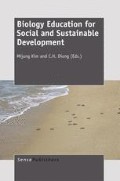Abstract
This research is a preliminary model/theory building based on Pandit’s process of building grounded theory from case studies and is qualitative in nature. The purpose of the study is to describe, analyze, and categorize what makes an excellent science teacher. Science teachers who were recipients of Teaching Excellence Award in Biology, Chemistry and Physics (in the Philippines) were selected using purposive sampling. Multiple methods of data collection were used, including, interviews, classroom observations and students’ evaluation.
Access this chapter
Tax calculation will be finalised at checkout
Purchases are for personal use only
Preview
Unable to display preview. Download preview PDF.
References
Baiocco SA, DeWaters JN. Successful College Teaching- Problem Solving Strategies of Distinguished Professors. USA: A Viacom Company; 1998.
Balsicas, N., (2005). Teaching Practices of the National Science Teacher Awardees. Unpublished Dissertation. University of the Philippines, Quezon City. M
Blair TR. Emerging Patterns of Teaching. London: Merill Publishing Company; 1998.
Batomalaque, http://www.criced.tsukuba.ac.jp/pdf/09
Borgatti. S. (2005). Introduction to grounded theory. RetrievedDecember, 2007, from http://www.analytictech.com
Charmaz K. Grounded theory: Objectivist and constructivist methods. In: Denzin N, Lincoln Y, editors. Strategies of qualitative inquiry. London: Sage; 2003. p. 265.
Corbin J, Strauss A. Grounded theory research: Procedures, canons, and evaluative criteria. Qualitative Sociology. 1990;13:3–21.
Cruickshank R, Bainer SL, Metcalf K. The Act of Teaching. Boston: Mcgraw- Hill College; 1992.
Easterby-Smith M, Thorpe R, Lowe A. Management research: An introduction. London: Sage; 1991.
Eisenhardt KM. Building theories from case study research. Academy of Management Review. 1989;14:532–550.
Glaser B, Strauss A. The discovery of grounded theory: strategies for qualitative research. Chicago: Aldine; 1967.
Pandit, N. R. (1996). The creation of a theory. A recent application of the grounded theory method. The Qualitative Report, 2(4). Retrieved September 11, 2007, from http://www.nova.edu.sss/QR/QR2-4/pandit.htmlSalandanan, G. (2000). Stauss, A., & Corbin, J. (1990). Basics of qualitative research: Grounded theory procedures and techniques. Newbury Park, CA:Sage
Wiles J, Bondi J. Curriculum Development. USA: McMillan Publishing Co; 1989.
Yin R. Case study research: Design and Methods. London: Sage; 1989.
Author information
Authors and Affiliations
Editor information
Editors and Affiliations
Rights and permissions
Copyright information
© 2012 Sense Publishers
About this chapter
Cite this chapter
Paez-Quinto, M. (2012). What Makes a Science Teacher Excellent. In: Kim, M., Diong, C.H. (eds) Biology Education for Social and Sustainable Development. SensePublishers, Rotterdam. https://doi.org/10.1007/978-94-6091-927-5_35
Download citation
DOI: https://doi.org/10.1007/978-94-6091-927-5_35
Publisher Name: SensePublishers, Rotterdam
Online ISBN: 978-94-6091-927-5
eBook Packages: Humanities, Social Sciences and LawEducation (R0)


